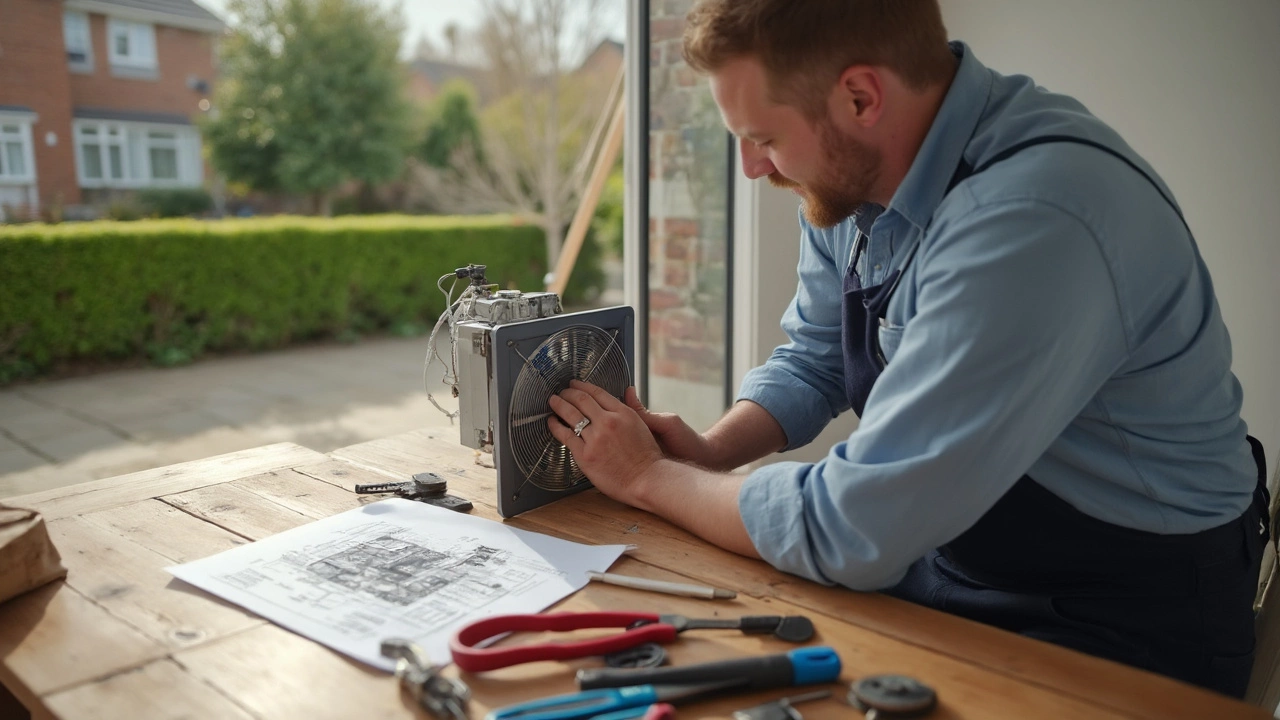Ever had a day when your kitchen is filled with smoke or your bathroom feels like a sauna? That's when you realize how much you rely on your extractor fan. These handy devices are the unsung heroes of home ventilation, keeping the air clean and fresh. But what do you do when they stop working?
The first step is knowing who to call. You might be surprised, but three different trades can help: electricians, handymen, and HVAC specialists. Each brings unique expertise, so picking the right one can save you time and money. For instance, electricians often handle electrical repairs and installations, making them ideal for a fan that's not getting power.
But before grabbing the phone, it's good to assess the situation. Sometimes, a simple DIY fix can do the trick, like cleaning a clogged vent or replacing a filter. Of course, if your fan is making strange noises or not running at all, it might be time to call in the pros.
- Why Extractor Fans Matter
- Common Issues with Extractor Fans
- Who to Call: The Right Trade for the Job
- DIY vs. Professional Repair
- Maintenance Tips to Prevent Future Problems
Why Extractor Fans Matter
Extractor fans do more than just clear the air; they're crucial for maintaining a healthy living environment. You might think they're just for getting rid of cooking smells or steam from your shower, but their role is more significant. These fans help remove excess moisture, reduce the risk of mold and mildew, and ultimately ensure the structural integrity of your home remains intact.
The battle against ventilation issues in high-humidity areas like kitchens and bathrooms is where extractor fans shine. By efficiently moving air out, they help avoid the build-up of moisture on walls and ceilings. This is important because prolonged exposure to moisture can lead to peeling paint and even damage to your drywall.
Moreover, these fans improve indoor air quality by eliminating airborne pollutants. Cooking can release particles and gases that linger in the air, potentially affecting respiratory health. An effective extractor fan not only clears these particles but also keeps your home smelling fresh.
Energy Efficiency and Cost Savings
Contrary to common belief, regular use of an extractor fan can save you money in the long run. How? By reducing the need for household repairs due to moisture damage and by helping your heating and cooling systems work more efficiently. When moisture levels are controlled, your space feels more comfortable without cranking up the heat or AC.
| Function | Impact |
|---|---|
| Moisture Control | Prevents mold growth and structural damage. |
| Air Quality | Reduces pollutants and keeps the air fresh. |
| Energy Efficiency | Minimizes energy usage by optimizing heating/cooling. |
So, the next time you hit the switch on your extractor fan, remember it’s doing a lot more than just making noise. It's an essential part of your home improvement strategy.
Common Issues with Extractor Fans
Extractor fans are pretty reliable, but like any appliance, they can hit a few snags. Knowing the typical problems can save you from unnecessary stress and calls for repairs. Let's break down some of these common issues so you can troubleshoot like a pro.
Not Turning On
First up, we've got the fan that refuses to start. This is often due to electrical issues. You might have a tripped circuit breaker or a blown fuse. In older homes, it's common for wiring to go bad over time. Here’s a quick tip: double-check your power supply before assuming the worst.
Noise Problems
The next common woe is noise—like a low hum or rattle. This could mean loose parts within the fan or an imbalanced motor. It's a good idea to inspect for anything loose or out of place. Sometimes just tightening a few screws is all it takes.
Poor Airflow
If your fan seems to be working but isn't clearing the air effectively, you might be facing clogged filters or obstructed vents. Over time, dust and grease build up, especially in the kitchen. Cleaning the fan’s filters and ensuring the vent is clear can make a huge difference.
Water Dripping
Drips aren't just annoying; they can lead to damage. This usually indicates condensation buildup, often from improper installation or insulation issues. Humidity in bathrooms can exacerbate this too. Addressing airflow and insulation can prevent these leaks.
Fan Stopping Mid-Operation
Lastly, if your extractor fan suddenly stops while running, it might be overheating. The motor could be struggling due to obstructions or age. In some cases, it's simpler to replace the fan altogether.
Here's a quick glance at some common solutions:
- Check power connections and circuit breakers for electrical issues.
- Tighten screws and inspect noise sources, especially when rattling happens.
- Regularly clean and maintain filters for optimal airflow.
Maintaining your extractor fan regularly can prevent these issues from snowballing into big problems. In homes, these little efforts go a long way in keeping things running smoothly.

Who to Call: The Right Trade for the Job
When your extractor fan starts acting up, knowing who to call can make a world of difference. While it might be tempting to try a quick DIY fix, sometimes professional help is essential. Let's break down who exactly you should contact for that peace of mind.
Electricians
If the fan is refusing to turn on, or has electrical issues like flickering power, an electrician is your go-to person. They specialize in dealing with the wiring and circuits that power your home appliances. It's crucial to ensure that any electrical repairs are done safely and effectively. Plus, licensed electricians can spot potential hazards that might not be obvious to the untrained eye.
Handymen
Handymen are like the jack-of-all-trades when it comes to minor home repairs. If your fan has mechanical issues like loose blades or faulty switches, they can often handle these well. Handymen are perfect for those quick fixes when you're dealing with home improvement problems that don't involve complicated electrical work.
HVAC Specialists
These pros focus on heating, ventilation, and air conditioning systems, making them perfect for fans connected to complex ductwork. They can address airflow problems or issues stemming from interconnected systems. HVAC specialists are essential for understanding how your ventilation fits into the bigger picture of your home's climate control.
Knowing which trade to call can save you time and money in the long run. When in doubt, start by checking if the issue is electrical, mechanical, or system-related. Also, it's always a good idea to read reviews and ensure whoever you hire is certified and experienced. This approach not only ensures a working fan but also a job done right the first time.
| Trade | Specialization |
|---|---|
| Electrician | Electrical issues and wiring |
| Handyman | Mechanical repairs |
| HVAC Specialist | Airflow and ductwork |
DIY vs. Professional Repair
When your extractor fan repair need arises, deciding between DIY and professional help is key. There's no one-size-fits-all answer, so let's break this down.
When to DIY
Tackling a repair yourself can be rewarding and cost-effective, but only for simple fixes. If your fan is clogged with dust or dirt, all you might need is a screwdriver and a vacuum cleaner. Careful cleaning can sometimes restore its function. Very often, it's just a matter of replacing a filter or tightening screws. These are jobs you can handle with basic tools and a little patience.
When to Call a Pro
But not all issues are DIY-friendly. If there's a burning smell, odd noises, or it's not turning on, it’s time to ring a pro. Remember, electricians and HVAC specialists know exactly what to look for. They can diagnose issues like electrical faults or motor failures that a regular person might not even notice.
Getting professional help might cost more upfront, but it prevents potential hazards like electrical fires or further damage.
The Cost of Choice
Let's talk numbers. A simple filter replacement could run you under $20 if you DIY. On the flip side, hiring a professional can range from $50 to $150—if they uncover a serious issue, you're covered. It's about weighing immediate expenses against long-term safety and effectiveness.
So, while DIY might be tempting, professional handyman services ensure your fans—vital for maintaining air quality—are in tip-top shape without risks.

Maintenance Tips to Prevent Future Problems
Keeping your extractor fan in top shape is easier than you might think. Regular maintenance not only extends its lifespan but also ensures your home stays well-ventilated. Here are some straightforward tips to prevent issues before they start.
1. Regular Cleaning
One of the simplest yet most effective maintenance tasks is cleaning. Dirt and grease can clog up your fan, reducing efficiency and causing strain on the motor. Here’s a quick cleaning routine:
- Turn off the power to your fan to avoid any accidents.
- Remove the cover and soak it in warm soapy water.
- Gently scrub away any dirt buildup with a soft brush or cloth.
- Make sure the blades and vents are free of dust and grime.
2. Check for Loose Components
Over time, the vibrations from a running extractor fan can loosen screws and other small parts. Periodically check and tighten any loose screws or components. If you notice any damaged parts, it might be time for a repair.
3. Replace Filters Regularly
If your fan uses filters, such as carbon filters, don't forget to replace them regularly. A good rule of thumb is to change them every six months, but always check the manufacturer's guidelines for your specific model.
4. Test Functionality
Simply turning your fan on and listening for unusual noises can go a long way. A well-functioning fan should be relatively quiet. If it’s making strange sounds or not operating smoothly, it might be time to bring in an expert like an electrician or an HVAC specialist.
| Maintenance Task | Frequency |
|---|---|
| Cleaning | Every 3 months |
| Filter Replacement | Every 6 months |
| Component Check | Every year |
By keeping up with these easy maintenance tips, you can prevent a lot of common ventilation issues and save on costly repairs down the line. Remember, a bit of regular attention can make a big difference in how well your extractor fan works.

I am an expert in the services industry with a focus on appliance repair. My passion lies in understanding how things work and educating others in simple, engaging ways. This enthusiasm fuels my writing, where I delve into topics around appliance maintenance and troubleshooting. I aim to make these subjects clear and accessible to all readers.